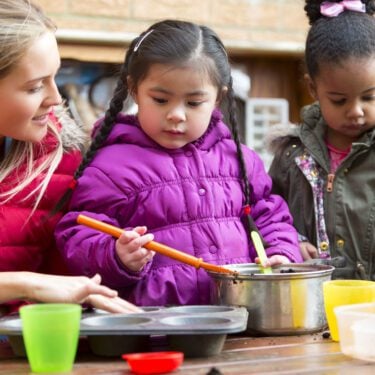
06/07/22
4 min read
Parents are under increasing pressure due to the cost of living crisis. Eleanor Ireland, Education Programme Head at the Nuffield Foundation, shares findings from our recent Time for parents evidence review about how parents can be better supported.
In the Autumn Budget the government announced £82 million in funding to support parents and children via 75 family hubs. This investment in services to support parents is very much needed at the moment, given the intense strain families faced during the COVID-19 pandemic and the continuing pressure on families caused by the cost-of living crisis. It is vital this investment is spent effectively in ways that are proven to make a real difference to the lives of parents and their young children.
Parents have a profound influence on their children’s well-being and early development. The care parents provide can enable children to fulfil their potential and protect them from some of the challenges they may face. But parenting doesn’t happen in a vacuum and the context in which parents raise young children affects both the way in which they are able to provide care and, ultimately, children’s development.
In Time for parents, we explore five aspects of parenting and the home: parental care, parents’ mental health, the relationship between parents, housing and families’ income and poverty. We consider how these aspects have changed over the past two decades, how the COVID-19 pandemic has been particularly challenging for parents of young children and what this means for supporting parents.
Parents are not getting the support they need
The well-known saying ‘it takes a village to raise a child’ felt very far removed from the experience of most families with young children during the COVID-19 pandemic. As the usual systems of support in terms of early education, childcare and informal support from grandparents and other family members was withdrawn, parents became solely responsible for their young child’s development. At the same time, many parents were also managing the pressures of economic hardship, illness, bereavement, needs of older siblings and demands of work. Unsurprisingly, these pressures have had implications for children’s development, parents’ mental health and relationships between parents. Coming out of the pandemic it is vitally important that families with young children are provided with the support they need when they need it, especially given the continuing stress many of them will be facing as a result of the current cost of living crisis.
All parents need help and support sometimes – often the kind of support they need is light-touch, such as support from friends and family or information or signposting to other services. However, we know parents don’t always get the support they need. Close to one fifth (18%) of parents of young children have two or fewer people they can turn to locally for help. Yet support is particularly important during transitions in families’ lives, such as when a child starts early years education or childcare and during challenging times in families’ lives, such as when relationships breakdown or when parents are struggling with their own mental health.
Parenting programmes to improve parenting and children’s outcomes
The government is planning on providing additional support to families from pregnancy to when children are 19 years old through Family Hubs. There will be a focus on support for families of the youngest children through £300 million funding for local authorities to deliver Family Hubs and early help services, including mental health support, parenting programmes and infant feeding advice for new parents.
There are a range of parenting programmes available that can improve parenting and children’s outcomes. The best place to access detailed information about these programmes is the Early Intervention Foundation Guidebook.
But the evidence about parenting programmes is still developing, and there are some key issues the government and the local authorities delivering Family Hubs need to consider when selecting which programmes to invest in.
Overcoming barriers and reaching families
Parenting programmes aren’t always accessible for parents. Despite consulting with families of toddlers about how to minimise some of the barriers they faced to accessing support, Dr Deborah Gibbard and colleagues struggled to improve attendance at their language support programme. The team concluded that making programmes accessible for parents from socially disadvantaged groups is still a challenge that programme developers and researchers need to address. An intervention that has been able to overcome barriers to participation is Empowering Parents, Empowering Communities, which has very good levels of attendance, attributed to the involvement of parents as trained facilitators of the programme.
Online parenting programmes
Most programmes for parents of young children have been developed to be delivered in-person – in families’ homes, early years education settings or Children’s Centres. However, during the pandemic many in-person programmes were adapted to be delivered remotely and online so that families could still access support. There is as yet limited evidence about the success of online programmes and it is important to ensure adaptation of in-person programmes for online delivery is thoroughly evaluated. Using digital technology raises questions about accessibility. Some parents do not have access to digital devices or the digital skills to participate fully in an online programme, while others might find attending an online programme easier than an in-person programme. It is also important to consider how the relationships, engagement and interactions that take place during in-person programmes can be translated to an online space. A team addressing some of these challenges are adapting an effective parent/child Shared Picture Book programme, usually delivered face to face, for remote, virtual delivery.
Supporting parents of the youngest children
While there are effective parenting programmes that support parents of 0 to 2s (for example, Family Nurse Partnerships, and Video-feedback Intervention to promote Positive Parenting and Sensitive Discipline), there are fewer available compared with programmes for older children. The government’s new commitment to support parents of 0 to 2s is very welcome, and much needed, but it will be important to ensure any programmes used for these families are evidence-based and evaluated. While parenting programmes can improve parenting and children’s outcomes, they are just one approach to supporting families and they may well be accessed by only a minority of parents. We know the overall picture of support available for parents is highly fragmented and varies a lot depending on where in the UK you live.
Reducing the pressure on parents
The government needs to urgently reduce the pressures on parents that have been exacerbated by the COVID-19 pandemic and the cost of living crisis. While parenting programmes can provide effective support for parents, they need to be part of a broader package of support for families. This broader support should include access to mental health services, boosted family incomes and improvements to the physical environment in which children are raised. Government and local authorities should also strive to join up services already provided for parents, so families know where to turn when they need help.




















































